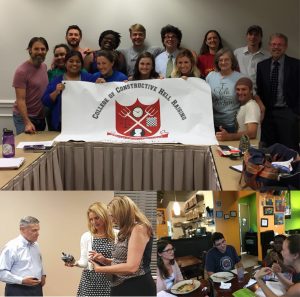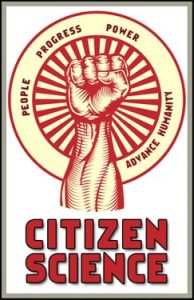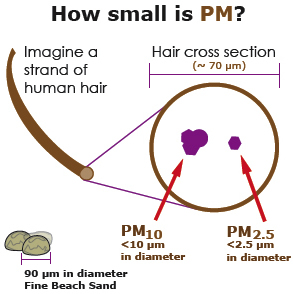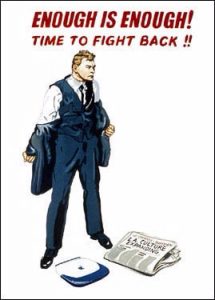Environmental Justice
Announcing Downwinders 3.0

Downwinders is Regrouping, Renewing, and Regenerating. Almost half our new board is under 30. We have a new scientist. We have a new focus. Now we need you.
Many of you are aware of the time and effort Downwinders at Risk put into the unprecedented UNT Ozone Study which brought DFW elected officials and local atmospheric researchers together for the first time to operate the same computer model for air quality used exclusively by the State and EPA.
The results of that study provided a practical map for compliance with the current federal ozone standard: new controls on coal plants, cement kilns and gas facilities. It was shared by local officials with the EPA in hopes of that agency drafting a new DFW air plan that might finally address these major sources of local air pollution.
Those hopes were dashed by the presidential election last fall.
Because of a perfect storm of regulatory changes and politics, we now believe that the EPA won’t intervene on behalf of DFW air quality for the foreseeable future. It appears DFW will not even have to submit another serious plan to address smog for at least a decade – if then.
Over the last 20 years no other group has leveraged as much change from DFW federal clean air plans as Downwinders at Risk. We won the first comprehensive study of cement plant air pollution control technology by the state. We got new smog-control technology installed on the Midlothian cement plants. We used the “Green Cement” provision of another federal smog plan to stop the burning of hazardous waste in those cement plants and close the oldest, dirtest kilns in North Texas. In the most recent plan, we exposed the large impact of oil and gas pollution on local DFW smog levels.
But while we’ll continue to stay in the EPA’s ozone/smog regulatory loop through legal representation, we don’t see any opportunity to impact public policy using federal clean air plans the way we have in the past.
With this change, we had to rethink how we work toward better regional air quality in North Texas. How do we impact the most lives, in the biggest ways, with the resources we have?
We’ve come up with three strategies, all of them taking advantage of our long history of increasing the ability of local residents and governments to take on dirty air themselves.
____________________________________________
OUR NEW PRIORITIES

Build a modern, independent, and citizen-friendly regional air pollution monitoring network for DFW
You can’t fix problems unless you know about them, and this is a way to begin building a regional alternative to state monopoly of air quality expertise and resources.

Identify, reduce, and eliminate health threats posed by widespread Particulate Matter (PM)pollution in DFW
PM is the new smog and local campaigns to reduce it can help a lot of people, especially those predominantly minority neighborhoods who’ve been dumped on the most.
Organize a grassroots campaign to restore local government zoning control of industrial hazards
A state government bought by polluters has gone too far in restricting the liberties of Texans and demolishing democracy at the local level. We’re fighting back.
____________________________________________
We co-founded the DFW Air Research Consortium last year with researchers from area universities and local governments with the idea of building a modern and locally-controlled air quality monitoring grid across DFW that can track pollution plumes in real time. This can become a powerful grassroots enforcement and education tool.
Downwinders itself bought two EPA-certified ozone monitors we’ll be using to specifically track smog levels in Wise County, where the State refuses to put a monitor despite evidence that’s where the region’s highest ozone readings are located.
This is more than just increasing the number of monitors – this is an opportunity to change the way people see air pollution affecting their lives. It’s also another opportunity to take what was the exclusive regulatory providence of an apathetic state government and give it to more concerned local governments.
We’re also beginning a new campaign focusing on microscopic pieces of soot known as Particulate Matter, or PM pollution. In recent years, PM pollution has been linked in the scientific literature to a wide variety of non-respiratory and cardiovascular diseases including ADHD, autism, Parkinson’s, dementia, and infertility. Like lead, many researchers believe there is no safe level of exposure to this kind of pollution.
Sources of PM pollution include any internal combustion engine, furnace, boiler and windswept piles of sand, or cement dust. Studies have found a correlation between proximity to a major source of PM pollution and increased risks of illness.
This is why other communities around the country are cracking down on idling trucks and buses and establishing buffer zones between major freeways and residences, parks and schools. We want to reduce the pollution as well as the exposure to it.
Finally, because there’s no hope of addressing air pollution from the oil and gas industry without any change in HB 40, the 2015 state law that took away local control of industrial zoning, we’ve begun a project aimed at building an alliance that challenges state overreach and promotes the restoration of traditional local control. Cities must have the right to protect their residents’ public safety and health. This campaign will challenge the status quo in both Austin and North Texas.
As always, they’ll also be campaigns we could not anticipate but have to wage. One example is the recent proposal by Dow Chemical to bag municipal trash for burning in the nation’s cement kilns. Dow has already targeted the local cement kilns in North Texas for this scheme, but Downwinders is pushing back hard and working with nationwide alliances to halt this project before it gets very far.
NOW WE NEED YOU

This coming THURSDAY is another North Texas Giving Day, a chance for your donations to be magnified by challenge grants and other incentives over the day. Because we’ve added responsibilities and staff, Downwinders at Risk needs this one to be our best, most productive Giving Day yet.
All transactions take place online that day. It’s simple to give and you can link to the Giving Day pay portal through our Downwinders’ website or FaceBook page beginning at 6 am on the 14th, and going all the way to midnight:
https://northtexasgivingday.org/npo/downwinders-at-risk-education-fund
DFW has been in continuous violation of the Clean Air Act for 26 years. We’re asking you to take a minute and contribute $26 to clean air work in the place where your lungs do most of their breathing.
We know hurricane season is testing the limits of our charitable giving, but $26 is all we’re asking. At a time when the state and federal government are intent on not protecting our air, Downwinders continues to be stubborn advocates for progress.
We deeply regret not being able to win a clean air plan for DFW in 2017 that might finally leave us in compliance with the Clean Air Act. But our long term goals remain the same. We hope you agree our work is worth your continued support. Thank you for your consideration.
DFW EJ Issues Get Some Muscle

New Attorneys and Paralegals Give Citizens Options
We know things look bleak right now. There are few bright spots. You wonder if every new possible small light you see is the end of the tunnel…or another train about to run you over.
Which makes what’s happening at the North Texas Legal Aid offices remarkable and worth knowing about.
For the first time in anyone’s memory, there are two attorneys, and at least that many paralegals, specifically dedicated to providing “free legal services, advocacy, and community education to individuals, community groups, and non-profit organizations” working on Environmental Justice issues.
And not just Environmental Justice. Fair and affordable housing, as well as more democratic and equitable community development now have many more local advocates than they did just a few months ago.
In essence, DFW citizens just got their own legal defense fund amped up to 11.
Legal Aid is an independent federal nonprofit established by Congress in 1974 to provide financial support for civil legal aid to low-income Americans. As long as you meet the agency’s income criteria, you have access to free legal services and resources (income up to 125% of the U.S. poverty line. In certain cases up to 200%). Both Dallas and Fort Worth have had under-staffed, under-budgeted offices for years, but still managed to do good work.
Representing rural residents of “Cement Valley,” a Dallas Legal Services lawyer, Robert Doggett, was co-counsel in Downwinders’ fight against the TXI hazardous-waste burning permit throughout the 1990’s. But that kind of direct participation in a high-profile environmental fight has been rare. These fresh hires are looking to change that.
As part of the newly-funded “Community Revitalization Project,” these attorneys will be providing “assistance and education to communities and individuals on how to use the law to ensure fair treatment and meaningful involvement of all people—regardless of race, color, national origin, or income—with respect to the government’s development and implementation of environmental policies, as well as the enforcement of environmental laws and regulations against polluters. The objective of CRP is to help ensure that all communities provide the opportunity for residents to live in a clean and healthy environment.”
In addition, staff will also assist “individuals and communities in developing and maintaining affordable housing, fighting housing discrimination and other illegal housing practices, and meaningfully participating in the development and implementation of policies that affect their neighborhoods. The goal is to help ensure that individuals and communities have equal access to affordable, accessible, and safe housing.” They’ll help to “educate citizens about their right to offer meaningful input on matters affecting their communities. CRP also works with communities to advocate for economic justice, develop fair access to transportation, fight predatory lending practices, and address systemic inequalities commonly found in low-income communities.”
 New lawyers from the Project are landing in other major Texas cities as well. There’s potential to do a lot of good here.
New lawyers from the Project are landing in other major Texas cities as well. There’s potential to do a lot of good here.
Moreover, the budgets for these new positions are not subject to Presidential, Congressional or state political tantrums. They’re funded for at least the next four years with money from a multi-million dollar settlement from “legal claims arising from mortgage-related activities by Bank of America and its subsidiaries.”
The monies are distributed by a third party, the Texas Access to Justice Foundation. They can’t be messed with. There’s hope of making the Project’s positions and mission permanent after the settlement money runs its course.
The result is a palpable shift in power. While it’s not close to matching the firepower of a government agency legal department or a polluter’s white shoe legal team, the presence of the the Legal Services effort in town means North Texas residents now have access to an extraordinary network of legal help they didn’t have just a few months ago.
And if our own organizational history tells us anything, it’s that a determined critical mass can make a huge difference against much larger and more powerful opponent.
Tulane graduate Matthew Miller is the Legal Service’s Project’s point person in DFW. His email is: millerm@lanwt.org
Don’t be shy. Use your imagination. It doesn’t have have to be a lawsuit. It can be as simple as a Open Records Act request, or sitting in on a meeting with officials. They want to be our legal counsel. Let’s make effective use of this new tool.

